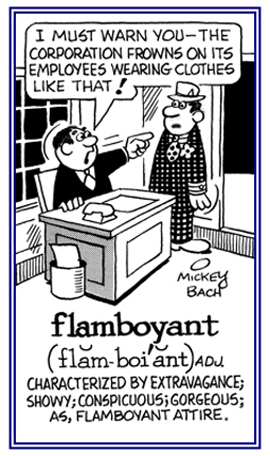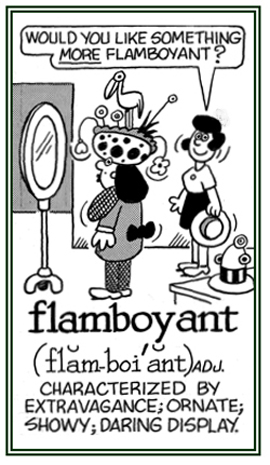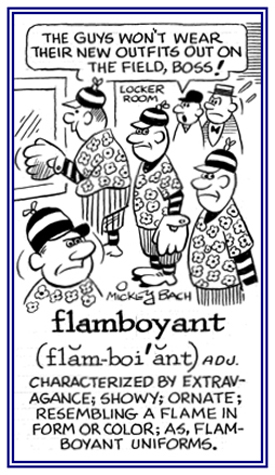You searched for:
“flamboyant”
A brilliant and very ornate object or structure: The city had a new government building with flamboyants in its architecture which were greatly admired by the citizens.
flamboyant (adjective), more flamboyant, most flamboyant
1. Relating to something that is highly elaborate and ornate or decorated with complex patterns: The company did not permit their employees to wear flamboyant clothes at work.
2. Characteristic of being richly colored and resplendent or attractive and impressive: Flamingoes are considered to be very flamboyant birds with their mainly pink or scarlet feathers.
3. Pertaining to a pretentious display which is designed to impress or to attract notice: The flamboyant pianist performed on TV for quite awhile with an orchestra in an unusually skillful way and with special facial expressions.
4. Etymology: "flame-like curves", from French flamboyant, "flaming, wavy" from flamboyer, "to flame" from Old French flamboier, from flambe, "flame".

© ALL rights are reserved.

© ALL rights are reserved.

© ALL rights are reserved.
Go to this Word A Day Revisited Index
2. Characteristic of being richly colored and resplendent or attractive and impressive: Flamingoes are considered to be very flamboyant birds with their mainly pink or scarlet feathers.
3. Pertaining to a pretentious display which is designed to impress or to attract notice: The flamboyant pianist performed on TV for quite awhile with an orchestra in an unusually skillful way and with special facial expressions.
4. Etymology: "flame-like curves", from French flamboyant, "flaming, wavy" from flamboyer, "to flame" from Old French flamboier, from flambe, "flame".



Go to this Word A Day Revisited Index
so you can see more of Mickey Bach's cartoons.
Word Entries at Get Words:
“flamboyant”
A flowering bush or tree native to Madagascar: The horticultural garden in the city has several flamboyants with brightly coloured blossoms in the non-indigenous species section.
This entry is located in the following unit:
Words of French origin
(page 4)
flamboyant (adjective), more flamboyant, most flamboyant
Characterizing a florid, lavish color, costume, or behavior: When performing, the pianist wore the most flamboyant outfit the audience had ever seen, reminding the patrons of the famous American star of the stage, Liberace.
This entry is located in the following unit:
Words of French origin
(page 4)
